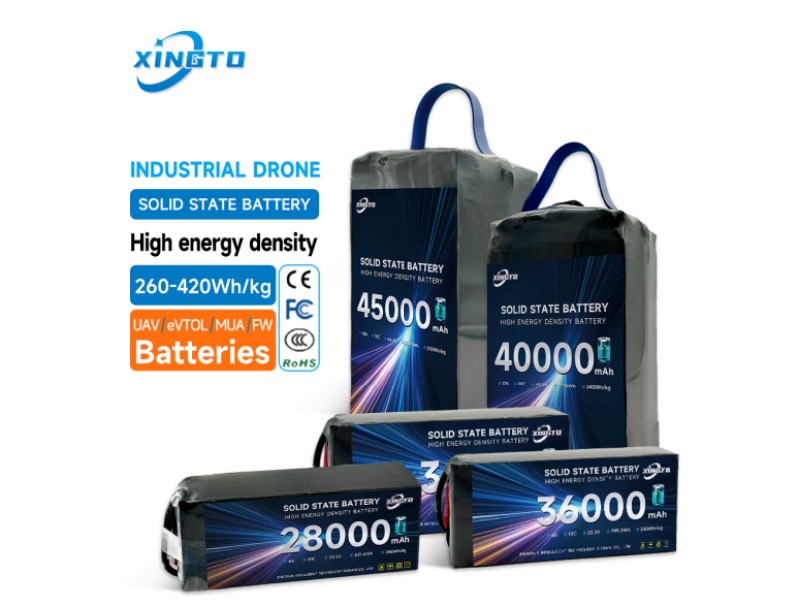From aerial photography to transportation and delivery, to agricultural monitoring, the use of drones in entertainment and industry is becoming increasingly widespread. If you own or plan to purchase a drone, the first question you may ask is: "Are drone batteries lithium batteries?" Yes - currently, most drones use lithium batteries. In this article, we will explore the commonly used battery types in drones, why lithium batteries are preferred, their advantages and limitations, how to choose suitable batteries, and how to properly select and maintain them.
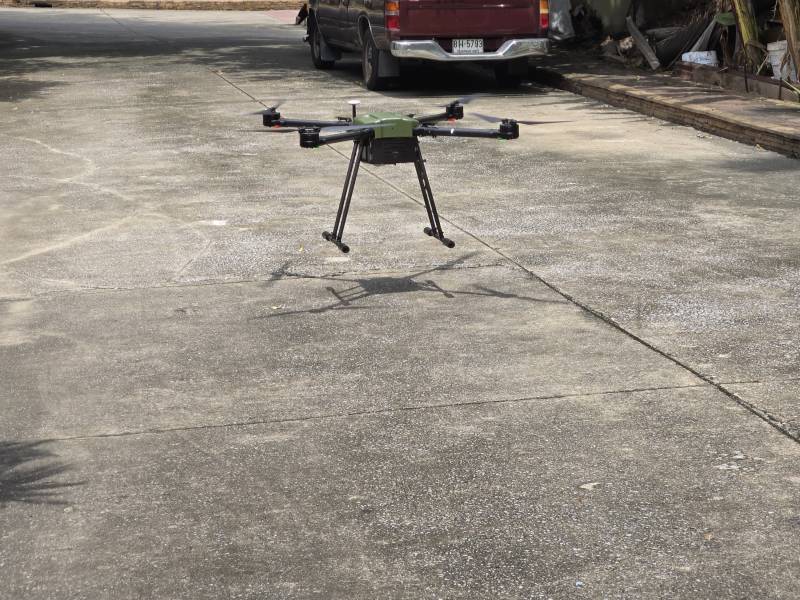
Why do most drones use lithium batteries?
Lithium batteries, especially lithium polymer (LiPo) and lithium ion (Li Ion), have become industry standards for drones due to their superior performance compared to old battery technologies such as nickel cadmium (NiCd) or nickel metal hydride (NiMH).
The following are the reasons why lithium batteries are favored in drones:
- High energy density
Lithium batteries can store a large amount of energy in relatively small and lightweight packaging. This is crucial for drones, which need to be as light as possible while still having enough power to extend flight time. - Lightweight structure
Compared to other battery types, lithium batteries are lighter, which directly contributes to better flight performance and longer flight time. - High discharge rate
Drones require sudden bursts of power to perform actions such as rapid ascent, quick maneuvering, or carrying payloads. Lithium batteries can provide high current without significant voltage drop, making them an ideal choice for these demanding tasks. - Rechargeable, long lifespan
Lithium batteries can be charged hundreds of times and have enormous value over time. If properly maintained, a high-quality lithium battery can last for several years.
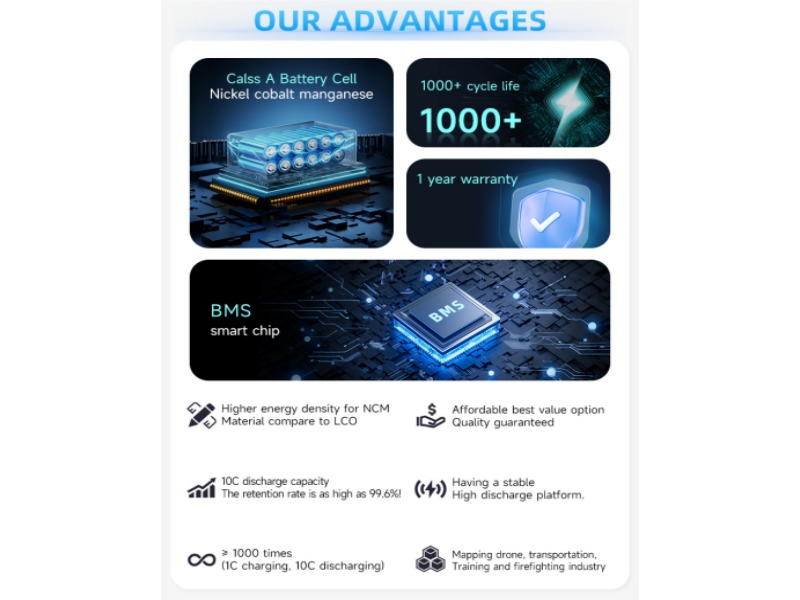
Types of lithium batteries used in drones
- Lithium polymer (LiPo) batteries
LiPo batteries are the most common type among consumer and professional drones. They achieve a good balance between weight, capacity, and emission rate. LiPo batteries come in various shapes and sizes to accommodate different drone models.
Opinion in favor:
Lightweight, high energy density, flexible shape, high discharge rate
deception:
Careful handling and storage are required for overcharging and puncture sensitivity. Improper maintenance can shorten the lifespan - Lithium ion batteries
Lithium ion batteries are more commonly used in industrial drones or large commercial drones. They are slightly heavier than LiPo batteries, but have better stability and safety under certain conditions.
Opinion in favor:
More stable, safer, with a longer shelf life, and more suitable for high-temperature environments than lithium
deception:
Compared to lithium, the discharge rate is lower in some cases
Are all drone batteries lithium batteries?
Although 95% of drones use lithium batteries, there are also some exceptions:
-Nickel based batteries: Older drones may use nickel hydrogen or nickel cadmium batteries, but these batteries are rare today due to their low energy density.
-Hydrogen fuel cells: Experimental drones use them for ultra long flights, but they are expensive and not widely used.

How to choose the appropriate drone battery
When selecting batteries for drones, please consider the following factors:
Flight time: Higher milliampere hours usually mean longer flight time, but also increase battery weight.
Voltage compatibility: Ensure that the battery voltage meets the requirements of the drone.
Discharge rate (C-level): A higher C-level is crucial for high-performance drones that require sudden bursts of power. Brand and Quality: Adhere to well-known brands to ensure safety and reliability.
Before purchasing replacement batteries, be sure to check the recommendations of the drone manufacturer.
How to maintain the lithium battery of a drone
Proper maintenance can significantly extend the lifespan of drone lithium batteries:
Avoid complete discharge: Do not let the battery be completely depleted. The goal is to land your drone, with at least 20% of the cost remaining.
Storage with correct battery capacity: When not in use for a long time, store the battery at around 50% of its capacity.
Stay away from high temperatures and humidity: Extreme temperatures can damage lithium batteries, please store them in a cool and dry place.
Use the correct charger: Always use the charger that comes with the drone or the charger recommended by the manufacturer.
Check for damage: Regularly inspect the battery for expansion, leakage, or other signs of damage. If any issues are found, replace it immediately.
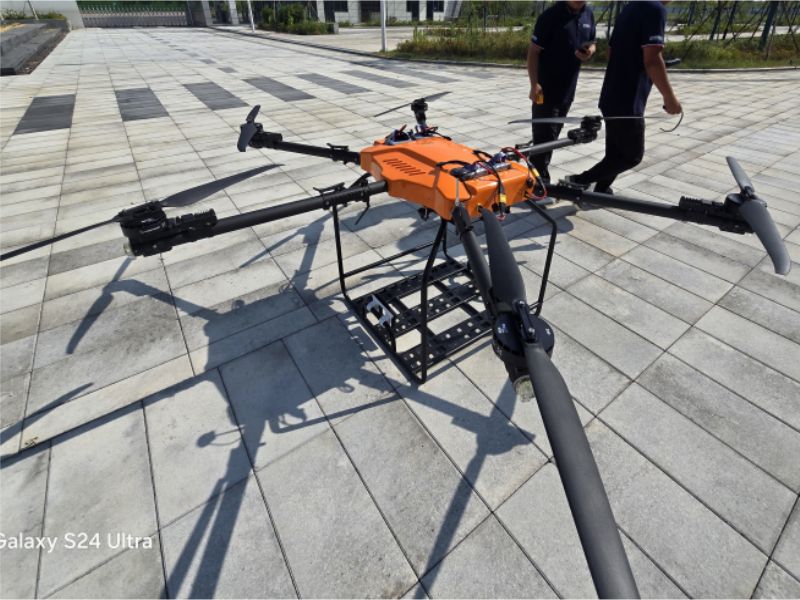
How to choose the appropriate lithium battery for your drone
- Check compatibility: match voltage (S-rated value) and connector type.
- Prioritize capacity (mAh): Higher mAh=longer flight time, but will increase weight.
- Consider discharge rate (Class C): High Class C (such as 50C) is suitable for racing drones.
- Brand reputation: Persist in using trustworthy brands.
Common questions about lithium batteries for drones
Q: Can I use non lithium batteries on my drone?
A: Only when the drone is designed for them (such as toy grade drones with NiMH). Most modern drones require lithium batteries.
Q: Why do lithium batteries expand?
A: Expansion is caused by gas accumulation due to overcharging, damage, or aging. Immediately stop using the swollen battery.
Q: How long is the endurance of lithium drone batteries?
A: Word charging usually takes 20-60 minutes, and the lifespan is usually 1-3 years, depending on usage. LiPo lasts for about 300 cycles; Lithium ions last for about 500-1000 cycles.
Q: Can I travel with lithium drone batteries?
A: Yes, but please comply with the airline's regulations (such as carry on only, capacity limitations).
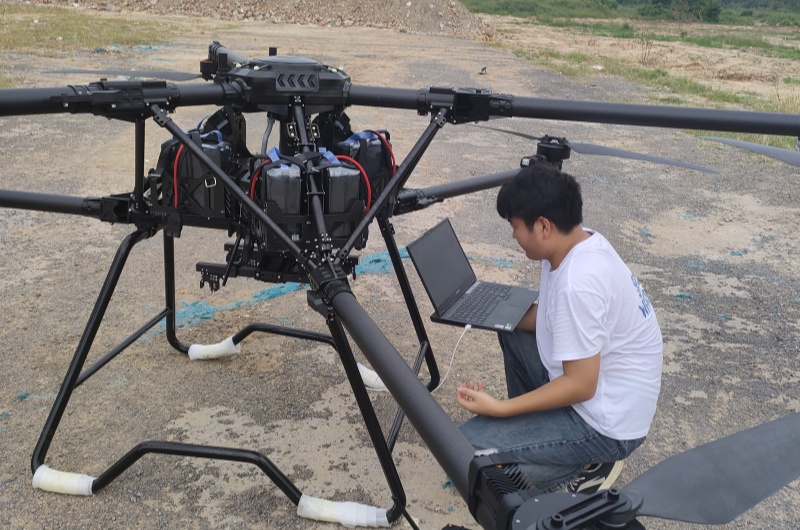
Common misconceptions about drone batteries
Misconception 1: All drone batteries are the same.
Wrong drones require different battery types, voltages, and capacities. Always use the correct batteries specified by the manufacturer.
Misconception 2: It is possible to charge drone batteries at night.
not always. Although modern chargers have overcharge protection, it is still safer to avoid long-term unattended battery charging.
Misconception 3: You can use any charger for your drone battery.
Wrong. Using incompatible chargers may damage the battery and even pose a safety hazard. Always use the correct charger.
conclusion
Most drones use lithium batteries, especially lithium polymer (LiPo) or lithium ion (Li Ion), because they are lightweight, have high energy density, and excellent performance. Understanding the types of batteries used in drones and how to maintain them is crucial for maximizing flight time, performance, and safety.
If you are unsure about which type of battery to purchase or how to maintain your current battery, be sure to refer to the drone's user manual or consult the manufacturer


